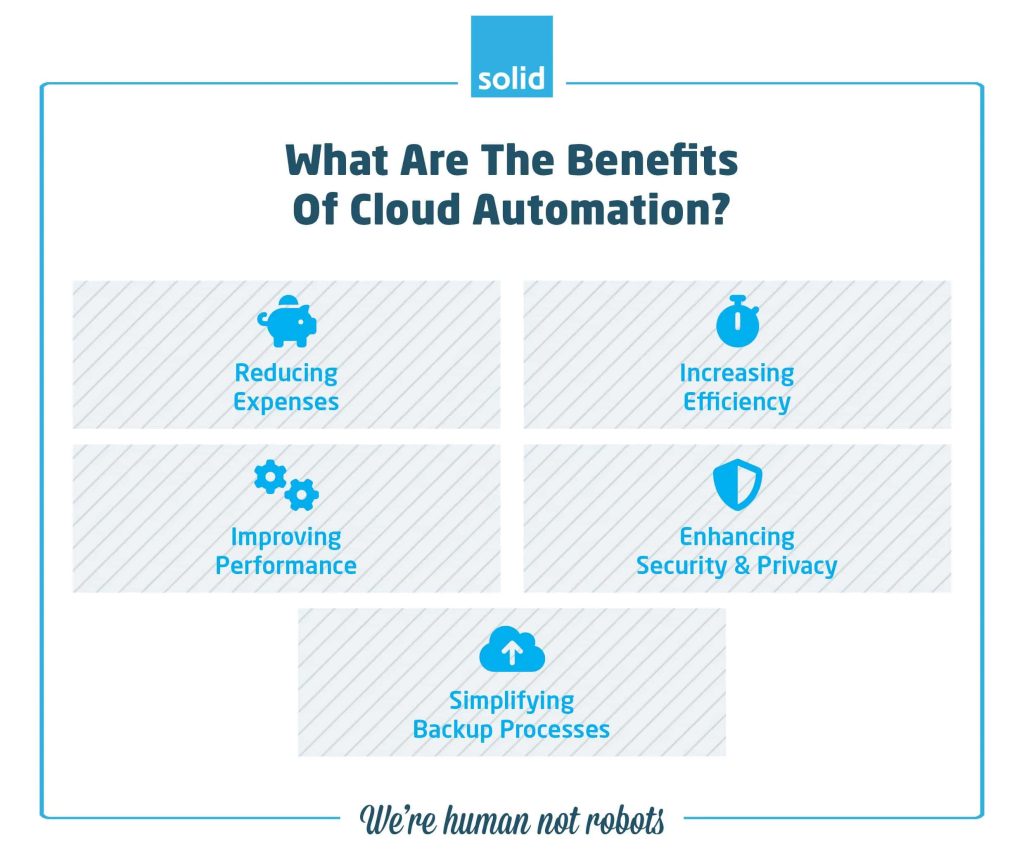
Are you tired of managing your business operations manually? Do you wish you could increase efficiency, reduce expenses, and improve overall performance? It sounds like a dream, doesn’t it? But with the right technologies it can easily become a reality.
Technologies are emerging on a daily basis that can revolutionise the ways that you and your humans work. So, let’s dive into just one of them, and take a look at cloud automation and the impact that it can have for your business.
What Is Cloud Automation?
At Solid Systems, we like to say that we’re human not robots. But we also know that robots (like Artificial Intelligence, Machine Learning and Cloud Automation) have their uses!
Cloud automation is the process of using technology to automate repetitive or time-consuming tasks in your cloud computing environment. Essentially, it allows you to set up automated workflows and processes that can run independently without human intervention, without taking up processing power on your devices, and without your needing to intricately manage them.
What Are The Different Types Of Cloud Automation?
Now that we have an understanding of what cloud automation is, there are various types that serve different purposes. Here are some of the main ones:
• Allocating Resources
One of the primary functions of cloud automation is to allocate resources in an efficient and cost-effective manner. This can include automatically scaling up or down server instances based on demand, as well as optimising resource usage across your entire cloud infrastructure. This not only helps to reduce costs, but also ensures that your resources are being utilised in the most effective way possible.
• Infrastructure Configuration
Another important type of cloud automation is infrastructure configuration. This involves creating and managing virtual machines, networks, storage, and other components of your cloud environment. With automation, you can easily set up and configure these elements without having to manually go through each step.
• Monitoring
Cloud automation also plays a crucial role in monitoring your cloud infrastructure. It can automatically monitor and track the performance of your servers, apps, and networks, providing real-time insights into any issues or bottlenecks that may be affecting your system. With this information, you can quickly address any potential problems before they impact your business operations.
• Security & Data Protection
Security and data protection are top priorities for any business, and cloud automation can help to ensure that your data is safe and secure. With automated cybersecurity protocols in place, you can rest assured that your sensitive and personal information is being protected against cyber threats and attacks. And by automating cloud backup and disaster recovery processes, you can make sure that any data that’s critical to your operations is kept safe in case of any system failures or breaches, and easily recoverable if anything goes wrong.
• Tagging
Tagging is another important aspect of cloud automation that often gets overlooked. With automated tagging, you can easily organise and categorise your resources and data, making it easier to track them, manage them, and assign relevant permissions to them, ensuring that the right humans always have access to the data and resources that they need. This can be particularly useful for businesses with large, complex or hybrid cloud environments, as it helps to streamline processes and improve overall efficiency.
What Are The Benefits Of Cloud Automation?

Now that we have explored the different types of cloud automation, let’s take a look at some of the key benefits that it can offer to your business.
• Reducing Expenses
First and foremost, cloud automation can significantly reduce your expenses. By automating tasks and processes, you’ll require less manual labour, freeing up valuable time for your employees to focus on more critical tasks. In addition, you’ll also save money on infrastructure costs as cloud automation can help to optimise your resource allocation and eliminate unnecessary spending.
• Increasing Efficiency
By automating some of your cloud processes, your business can run operations in the cloud 24/7, even after-hours, ensuring that tasks get completed in good time, without overworking your humans or your IT team. It will also help them to increase their own efficiency without needing to worry about monotonous tasks like backing up their data.
• Improving Performance
Not only will your humans be able to better focus their efforts, but your infrastructure will see a boost in performance as well, since a lot of the operations that cloud automation is going to run are going to be based on cloud servers, rather than your own hardware. This means that you can run multiple automations and tasks at the same time, without it ever impacting your operational capacity.
• Enhancing Security & Privacy
Security and privacy are crucial considerations for any business, especially when it comes to storing sensitive data in the cloud. With cloud automation, you can implement security protocols and automated backups to ensure that your data is always safe and secure. A lot of cloud automation tools also offer advanced security features such as encryption and access controls, giving you peace of mind that your data is in good hands.
• Simplifying Backup Processes
Data backups are a vital part of any business, and cloud automation can greatly improve this process. By automating backups, you’ll never have to worry about manually scheduling them or forgetting to do so. This ensures that your data is always backed up, reducing the risk of data loss in case of a disaster.
Cloud Automation Tools That You Can Use
Now that we’ve discussed the benefits of using cloud automation let’s take a look at some of the top tools that you can use to implement it.
• Microsoft 365
Microsoft 365 has a lot of powerful cloud automation tools that integrate across multiple apps such as Word, Excel, PowerPoint, and more. It also offers advanced security features, and SharePoint and OneDrive allow you to set up automated backups for your data, ensuring that you never lose documents, and your company as a whole is able to manage versions of files in better ways without compromising your data integrity.
• Microsoft Azure
Another popular choice for cloud automation is Microsoft Azure. It provides a wide range of automation tools that can help you with tasks such as infrastructure configuration, resource allocation, and monitoring. Like Microsoft 365, it also offers advanced security and data protection features that make it a reliable option for businesses looking to automate their cloud processes.
• Other Cloud Services
Aside from Microsoft 365 and Azure, there are many other cloud services that offer powerful automation tools such as Google Cloud, Amazon Web Services, and IBM Cloud. Each of these services has its own unique features and benefits, so it’s important to research and choose the one that best fits your business’s specific needs.
How Can Solid Systems Help?
As a leading IT company and cloud solutions provider, Solid Systems is well-versed in putting the latest technologies like cloud automation to their best advantage, helping businesses thrive in today’s digital landscape. Our team of IT Pros can not only help you to implement the right cloud tools in the right way to streamline your processes, reduce expenses, and increase security and privacy, but we also work with your business to understand your unique needs and put strategic technology roadmaps in place which will help you to adopt the right technologies to see you grow. With our extensive knowledge and experience, we are one of the best cloud providers in South Africa and the UK.
So if you’re looking to do more with your cloud solutions and take advantage of the benefits that cloud automation holds, schedule a free IT consult with us today, and let’s find the right tools to see your business stepping confidently into the future.
Frequently Asked Questions
Cloud automation plays a pivotal role in managing and streamlining cloud-based operations. It enables automatic control and execution of tasks, resulting in reduced errors and improved efficiency. By automating repetitive tasks, it allows businesses to focus on strategic, higher-level work, enhancing overall productivity. More than that, it supports scalability and ensures consistency, essential for businesses in the digital age.
When we talk about cloud automation, we are referring to processes which can be applied to your cloud data and infrastructure without needing any human intervention. These can include tasks like allocating your cloud resources, configuring your infrastructure, monitoring your data and servers, putting security measures like encryption and backups in place, or tagging data across various cloud platforms.
Cloud-based automation offers many advantages, from reducing operational overheads through the streamlining of tasks, to enhancing security with automated protection measures, to improving scalability for fluctuating business demands and increasing productivity by freeing up your humans’ time from repetitive tasks.
Popular Searches
- Cloud Computing and Cloud Infrastructure
- Office 365 Valuable Tools
- SharePoint Migration Checklist
- What Is Microsoft Intune?
- Business Cyber Hygiene Checklist
- Cloud Access Security Broker
- Azure AD and Windows AD
- Cloud Migration Strategy Impact
- Beginner's Guide to Microsoft 365 Groups
- Tips for Virtual Collaboration
- Microsoft SharePoint Vs OneDrive
- Cyber Security Awareness
- Threats to Data Integrity
- Cloud computing security best practices





